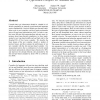Free Online Productivity Tools
i2Speak
i2Symbol
i2OCR
iTex2Img
iWeb2Print
iWeb2Shot
i2Type
iPdf2Split
iPdf2Merge
i2Bopomofo
i2Arabic
i2Style
i2Image
i2PDF
iLatex2Rtf
Sci2ools
181
click to vote
PLDI
1995
ACM
1995
ACM
A Type-Based Compiler for Standard ML
Compile-time type information should be valuable in efficient compilation of statically typed functional languages such as Standard ML. But how should type-directed compilation work in real compilers, and how much performance gain will type-based optimizations yield? In order to support more efficient data representations and gain more experience about type-directed compilation, we have implemented a new type-based middle end and back end for the Standard ML of New Jersey compiler. We describe the basic design of the new compiler, identify a number of practical issues, and then compare the performance of our new compiler with the old non-type-based compiler. Our measurement shows that a combination of several simple type-based optimizations reduces heap allocation by 36%; and improves the already-efficient code generated by the old non-type-based compiler by about 19% on a DECstation 5000.
Old Non-type-based Compiler | PLDI 1995 | Programming Languages | Standard ML | Type-based Optimizations |
Related Content
| Added | 26 Aug 2010 |
| Updated | 26 Aug 2010 |
| Type | Conference |
| Year | 1995 |
| Where | PLDI |
| Authors | Zhong Shao, Andrew W. Appel |
Comments (0)

